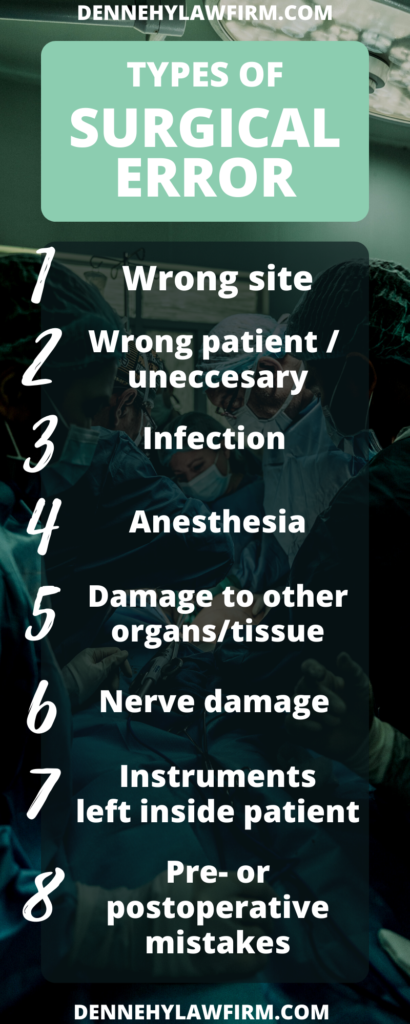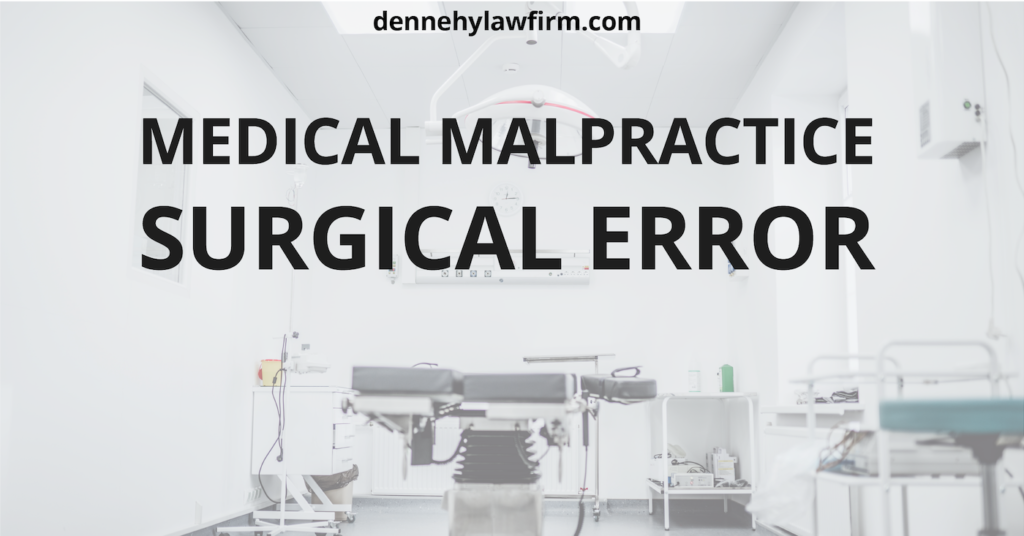Surgeons make mistakes and, when they do, these mistakes can lead to injury, permanent disability and even death. At Dennehy Law Firm, we take on malpractice cases, including those that involve surgical error in the operating room, to change the way medicine is practiced and achieve systemic change. Each of our cases has the real potential to improve the way doctors, hospitals and nurses care for patients like you.
If you or a loved one is the victim of surgical error, you or they may be entitled to compensation. Please get in touch for a FREE consultation with Susan Dennehy: call 212-974-6100 or fill out this form.
Recent win: A case settled during trial for $1,400,000 for the death of a woman in her 60’s whose infection was not timely diagnosed.
More recent wins here.
*Please make sure to read our disclaimers relating to this article – see below.
Table of Contents
Can you sue for surgical errors?
Surgical error is a common type of medical error that may incur a medical malpractice lawsuit in the United States. Normally, if a death during surgery or an injury due to surgical intervention could have been avoided, the individual that was injured in the event, or family members on behalf of the individual in question, can legally sue for damages. This is also applicable if evidence demonstrates that harm or death came about due to inattention or negligence by the surgeon / medical practitioner.
What are the most common types of surgical error?
Surgical error that occurs in the operating room is considered surgical malpractice, but surgical malpractice can occur in many other ways, both in and outside the operating room. Here are a few common types of surgical error:
- Wrong site surgery
- Wrong patient surgery / unnecessary surgery
- Errors that cause infection
- Errors in application of anesthesia
- Damage to tissue and/or internal organs
- Damage to nerves
- Instruments and other foreign objects left inside patients
- Pre- or postoperative mistakes

Surgical error: Wrong site surgery
Wrong site surgery, as you might imagine, occurs when a doctor performs surgery on the wrong organ or body part.
Shockingly, there have even been cases when the wrong limb has been amputated, the wrong kidney is removed, or the wrong knee is “fixed”.
Surgical error: Wrong Patient/Unnecessary Surgery
Similarly, wrong patient surgery, though less frequent than wrong site surgery, takes place when a patient undergoes a surgery that is later deemed unnecessary.
Surgery can be invasive and puts the body under stress and trauma. If an unnecessary surgery is performed, and there are negative consequences as a result, the patient can sue for medical malpractice.
This type of surgical error often takes place due to miscommunication between doctors/nurses and other healthcare professionals, gaps in hospital policy or a lack of standardization in hospital rules and regulations. If patients’ identities are not correctly verified prior to surgery, a surgeon may even perform surgery on the wrong person.
Surgical error: Infection
Infection is a common result of surgical error and can lead to sepsis, necrotizing fasciitis, permanent damage to organs, amputation and even death. This error may arise due to unsanitary preparation of surgical instruments or failure to diagnose an infection following surgery.
Infections are treatable with antibiotics, but unless the infection is caught on time, consequences may be dire.
Surgical error: Application of anesthesia
Without proper dosing of anesthesia, surgery simply wouldn’t be possible However, when anesthesia is incorrectly dosed or applied, surgical error in the operating room can lead to serious, and sometimes fatal, injury.
If a patient receives too little anesthesia, they may wake up in the operating room and suffer traumatizing pain. Too much anesthesia and the patient may suffer from brain damage, oxygen depletion or death. If patients are allergic to anesthesia, the risk for injury or death also increases.
Surgical error: Damage to tissue and/or internal organs
Surgery is delicate and when a patient undergoes surgery, it is possible that tissues and other internal organs may be damaged in the process. The surgeon’s scalpel may accidentally cut or puncture a nearby organ. If enough damage occurs, this can lead to long term health issues and even death.
Surgical error: Damage to nerves
Nerve damage may occur as a result of the incorrect administration of anesthesia or if, as in the above section, the surgeon in question accidentally cuts, nicks, perforates an organ or area near the surgical site. These injuries can lead to great pain, infection and disabilities.
Surgical error: Instruments and other foreign objects left inside patients – Surgical Instruments Left in Body
Though this may sound unbelieve, surgical instruments are often left inside a patient after the surgery. That is, the surgical opening has been stitched closed and a foreign object remains inside the patient!
As you might imagine, this can be extremely dangerous and painful to the patient in question and can lead to serious infection, pain and death.
Normally, hospitals require surgical instruments like clamps, gauze, scalpels, sponges etc to be counted prior to the surgery, but mistakes may still be made.
Surgical error: Pre- or postoperative mistakes
As mentioned, not all surgical errors occur in the operating room. Many take place before or after the surgery, for instance if a doctor fails to address complications that arose as a result of the surgery.
These types of errors can lead to paralysis, serious health complications, brain injury and even death.
When Does Surgical Malpractice Happen?
Surgical error is, unfortunately, rampant. In the United States, there are more than 4,000 instances of surgical error per year and most malpractice cases that take place in hospitals have to do with surgical errors, while cases related to outpatient care (outside of the hospital) have to do with errors in diagnosis i.e. infection.
Though most people imagine that surgical errors occur during surgery, the reality is surgical malpractice may occur in the operating room, before and after surgery.
Surgical malpractice before surgery
Improper preoperative care can be considered surgical error. This occurs when your doctor/surgeon does not properly consult with you as a patient. For instance, they must be thoroughly updated about your medical record in order to inform you of potential risks, side effects and alternative forms of care.
As part of your preoperative care, other health practitioners may be involved to ensure they have a full and accurate picture of your upcoming surgery. Apart from your surgeon, your anesthesiologist may also visit to answer your questions and meet you in person, thereby reducing the chance of performing an operation on the wrong patient.
Surgical error in the operating room
During a surgery, you would expect that your surgeon is qualified to perform the surgery, having had many hours of training. However, all surgeons do not always have equal levels of skill and specialization. Similarly, some hospitals may have higher caliber doctors and surgeons than others.
The tools used by the surgeon and surgical team need to be properly sterilized and counted. Any mistake here can lead to forgotten tools inside a patient’s body or infection, in the case of unsterilized tools.
During surgery, there should be no unnecessary distractions that may lead to a mistake, be it an accidental perforation of a nearby organ or a lapse in proper administration of anesthesia. If a surgery is unnecessarily rushed, this may also lead to mistakes during the procedure.
Surgical error after surgery
Post-operative care, i.e. care following surgery, is a vital part of a patient’s recovery and if mistakes are made during this segment of care, it may still be considered surgical error.
Following surgery, there may be a high risk of infection and patients must be closely monitored for any significant changes in their vitals and overall health. Health practitioners must closely observe patients and only release, or discharge, them once they are ready.
Follow up must also be thorough, ensuring patients are well informed of options, follow up treatment, potential complications and more.
Who is responsible for surgical errors?
Surgical error may be made by surgeons or anyone other health practitioner involved in the surgical procedure prior to, during and following surgery. This includes the anesthesiologist.
What constitutes surgical malpractice?
Surgical malpractice is a type of medical malpractice, surgical malpractice refers to improper, negligent, or even illegal activity conducted by a surgeon, anesthesiologist, or any other medical professional during surgery that results in injuries to a patient.
In rare instances, the patient dies as a result of surgical negligence. In these cases, the surviving family members can bring a legal claim in the form of a wrongful death lawsuit.
*This article, and all others on our website, does not replace legal advice and cannot be used as such. Neither are these articles exhaustive. Please always inquire with certified legal counsel if you are pursuing a medical malpractice lawsuit of any sort.

